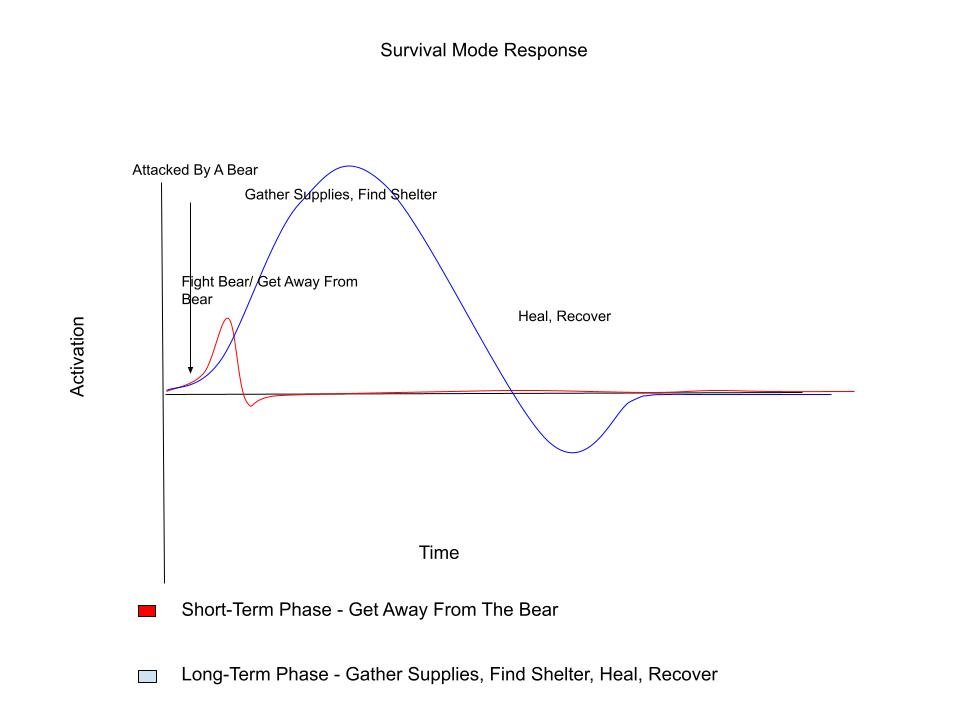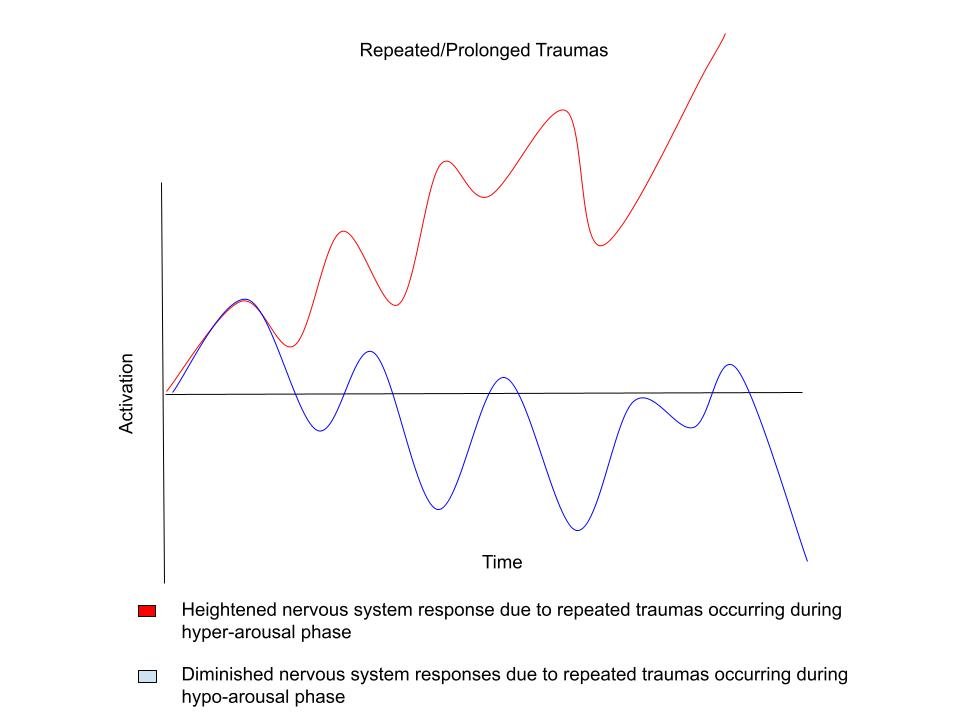Alrighty, folks! Here it is - the oft promised but repeatedly delayed final post of the Survival Mode Series!!
(Insert trumpet sounds)
I feel like this has been a big build up for something that’s really probably not going to be all that interesting for anyone who isn’t a brain geek… Alas - I AM that brain geek, and I’ll write what I want.
So - let’s get into it, shall we?
My last post is going to deal with those last few Survival Mode Types I talked about in posts 2 and 3, plus a few extra caveats for all of this in general. These require a whole special post all their own because they are actually super complex, difficult to treat, and always very interesting. These types deal with repeated and/or prolonged traumas, but not just any repeated traumas - repeated life-threatening (or potentially life threatening) situations that you have no choice in or escape from.
These don’t have to be actual life-threatening situations either. I think that this can be confusing for folks sometimes. Your stress levels just have to be high enough that your body thinks that you must be facing a potential life-threatening situation. This can be having to deal with a bully at work, a volatile home life where you can’t relax and switch out of your stress mode, even just having a high-stress job in general - over a long enough time-line, those situations can be incredibly damaging to your nervous system and long-term health.
But, let’s go back to our Survival Mode Bear analogies. The main thing I want to talk about in this post is how our nervous system responds when we’re facing a long-term threat to our survival (like a global pandemic).
So, going back to our bear analogy - imagine that you have happened upon a bear in the woods, but that bear decides to follow you home. No matter what you do, you can’t shake the bear.
Remember that graph I showed you in the third post about the short-term and long-term phases of Survival mode? Our stress response basically follows an action potential pattern.
That’s how our normal stress response looks. Our Survival Mode Response is similar, but has two separate phases - short-term (to get you away from the danger) and the long-term (to get you the stuff you need and safety for long enough to heal and recover).
You can develop dysfunctions of this response where you get stuck in either an up phase or a down phase as well, which require specialized treatment with someone like me who specializes in nervous system rehabilitation, but otherwise, you can generally get through this with just your standard treatments and supports and be none the worse for wear.
Of course, this response is dependent on you being able to get away from the bear. So, what happens if the bear lives with you or works with you? Remember how I said that if you’re not given a chance to go through the whole cycle properly and start a second one before the first is finished, the second one starts from wherever you are in that process?
When faced with repeated traumatic exposures, your nervous system has a few main options to deal with this situation. Often, it depends on the circumstances and the amount of control you feel you have over the situation that determines the specifics of how your nervous system responds and how you’re going to deal with the situation, but regardless, you’re going to need some rehabilitation later to get it back under control once the dangerous situation has been resolved (you may need extra help during this as well, so that you can get the dangerous situation resolved).
What’s interesting is that these responses, when done correctly, can actually increase your odds of survival. When done incorrectly, they can decrease it. Regardless, they are a last ditch effort of a nervous system pushed well past the brink which produces lasting damage that takes a very long time to rehabilitate.
Tend and befriend - Also known as people-pleasing behaviour. Ever hear of Stockholm Syndrome? Or Battered Woman Syndrome? The actual syndromes themselves are controversial, but the underlying physiology of it is still relevant. When you find yourself a long-term captive of a situation where your life is dependent on the approval of your captor, you try to make friends with them. You basically try to tame the bear. If you can learn its moods and behaviours, you feel like you can manage the situation. You can even develop kind feelings for your bear - especially if this is a parental figure, sibling, spouse, or friend. It’s this response that gets people trapped in a lot of very unhealthy friendships and relationships, but it does tend to have the best treatment outcomes.
Learned helplessness - you can’t tame the bear nor escape the situation so why even bother trying? Even when circumstances change and the bear is gone, you still don’t try to do anything, because why bother? What’s the point? There will just be another bear eventually.
Full shut down - no emotions, diminished responses, your entire system represses just about everything. Life seems fine on the surface, you go about the motions, but you’re pretty much dead inside. Your brain has decided the bear isn’t the problem, your reactions (emotions, feelings, etc.) to the bear are. Everything is just numb always. These folks are usually pretty high functioning, to a point. Typically leads to risk-taking behaviours, self-harm, etc., anything to feel something.
Full flip out - EVERYTHING is a threat and is trying to kill you. Also known as, when all else fails, go apesh*t.
Because these kinds of traumas are something that typically happen during your formative years (meaning, it’s usually within your own household during childhood), these kinds of traumatic circumstances can set your nervous system up for a life-long kind of Survival Mode setting that is not at all functional later in life. If these kinds of traumas happen later in life, but you had a relatively healthy upbringing, they’re easier to treat. It all kind of depends on the circumstances.
How does this relate to the pandemic?
The pandemic is both a repeated and prolonged trauma. Depending on the life circumstances you have already been through, or are also going through concurrently, you may not be handling it all that great. The key to managing your nervous system during repeated or prolonged trauma is the amount of control you feel you have in the situation and your ability to remove yourself from the situation for periods of time when you need to. This is why the Hide Box strategy and good boundaries around it are useful for being able to properly navigate this.
Types of Trauma Responses Over Time
Image Source:
Prototypical patterns of disruption in normal functioning across time following potentially traumatic events (PTEs).
Bonanno, G. A., & Mancini, A. D. (2012). Beyond resilience and PTSD: Mapping the heterogeneity of responses to potential trauma. Psychological Trauma: Theory, Research, Practice, and Policy, 4(1), 74–83. https://doi.org/10.1037/a0017829
Remember waaaaaay back in the early days of the pandemic, I put on the ‘Strength Training Your Resilience’ workshop? This was why. Resilience is such an important skill for learning how to navigate life’s ups and downs, but it’s also like exercise for your nervous system. A properly functioning nervous system is so important for being able to get through those ups and downs, and it’s something that you actually have control over maintaining and optimizing. You don’t have to be at the whim of your own nervous system. Meaning, for the most part, your trauma reactions are under your control. You may just need to learn how to best work with your nervous system so that you get to be that happy little line at the bottom of that graph.
If this is your first major trauma, you may have had a big initial Survival Mode Response that, now that you’ve gotten used to it and life is getting back to normal, seems kinda okay now. Or, you may have had other repeated or prolonged traumas in your life and this was the final straw for your nervous system and now it’s decided to go into Full Flip Out. Point is, everyone’s situation is unique. People are going to seem fine, and then a few years from now really not be fine. Or, they were really not fine already but are coming out of it now and will be doing okay. Either way, we can all try our best to recognize that everyone’s got something and how they’re responding to life these days is just biology. So whatever slight you might think someone has committed against you, it’s likely more about whatever underlying issues you’re probably not dealing with than anything actually related to the other person. And if someone is flipping out at you over nothing - that’s a Them problem, not a You problem. Try not to get drawn into it.
We can all be kind to each other, even if our nervous systems are flipping out a bit. But! It is also our responsibility to get that treated should we find ourselves flipping out over everything. Life happening to you is not your fault. It happens to everyone. But it IS up to you to heal the wounds left behind. It is not on your friends or family to do that healing for you nor manage your reactions from them. There are people whose job it is to help you with that.
Where to start to find them:
https://novascotia.ca/mental-health-and-wellbeing/
https://www.canada.ca/en/public-health/services/mental-health-services/mental-health-get-help.html
I’m super glad that so many people have found this series so helpful! Thanks for reading, and, as always, feel free to reach out if you have questions. We’re all in this together!
Till next time, folks!





